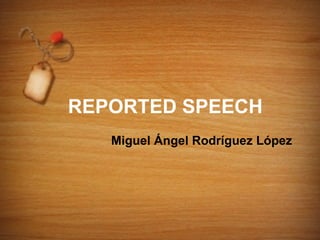
Reported speech Bachillerato
- 1. REPORTED SPEECH Miguel Ángel Rodríguez López
- 2. DEFINITION Reported speech (also known as indirect speech) refers to a sentence reporting what someone has said. When we use reported speech, we are usually talking about the past (because obviously the person who spoke originally spoke in the past). The verbs therefore usually have to be in the past too. "I'm going to the cinema". He said he was going to the cinema.
- 3. RULES In all sentences, the quotation marks and the comma immediately before the first quotation mark are removed. Next, the word "that" is usually inserted after the reporting verb. Then, there are certain changes to be considered. She said, “I work very hard." She said that she worked very hard.
- 4. 1. Tense changes As a rule when you report something someone has said you go back a tense (the tense on the left changes to the tense on the right): Direct speech Indirect speech Present simple Past simple › She said, "It's cold." She said it was cold. Present continuous Past continuous She said, "I'm teaching › She said she was teaching English online." English online. Present perfect simple Past perfect simple She said, "I've been on › She said she had been on the web since 1999." the web since 1999.
- 5. Present perfect continuous Past perfect continuous She said, "I've been teaching › She said she had been teaching English for seven years." English for seven years. Past simple Past perfect She said, "I taught online › She said she had taught online yesterday." yesterday. Past continuous Past perfect continuous She said, "I was teaching › She said she had been teaching earlier." earlier. Past perfect Past perfect She said, "The lesson had › NO CHANGE - She said the lesson already started when he had already started when he arrived. arrived." Past perfect continuous Past perfect continuous NO CHANGE - She said she'd She said, "I'd already been › already been teaching for five teaching for five minutes." minutes.
- 6. Other tense changes Modal verb forms also change: Direct speech Indirect speech will would She said, "I'll teach English › She said she would teach English online tomorrow." online tomorrow. can could She said, "I can teach English › She said she could teach English online." online. must had to She said, "I must have a › She said she had to have a computer to teach English computer to teach English online. online." shall should She said, "What shall we learn › She asked what we should learn today?" today. may might She said, "May I open a new › She asked if she might open a new browser?" browser.
- 7. 2. Time and place changes Time and place references change: now › then today › that day here › there this › that this week › that week the following day tomorrow › the next day the day after
- 8. the following week next week › the next week the week after the previous day Yesterday › the day before the previous week last week › the week before previously Ago › before 2 weeks previously 2 weeks ago › 2 weeks before Tonight › that night the previous Saturday last Saturday › the Saturday before the following Saturday the next Saturday next Saturday › the Saturday after that Saturday
- 9. Examples: I went to the theatre last night. He said he had gone to the theatre the night before. I'm staying here until next week. He said he was staying there until the following week.
- 10. 3. Pronouns Personal pronouns need to be changed according to the situation. “I run 5 km every day”, said she. She said she ran 5 km every day.
- 11. Besides, some demontratives must be changed: THIS changes to THAT And THESE to THOSE: She said ‘I like this shirt’ She said she liked that shirt.
- 12. 4. Reporting Verbs Said, told and asked are the most common verbs used in indirect speech. We use “asked” to report questions: I asked Lynne what time the lesson started. We use “told” with an object. Lynne told me she felt tired. We usually use “said” without an object. Lynne said she was going to teach online. If “said” is used with an object we must include “to” Lynne said to me that she'd never been to China.
- 13. There are many other verbs we can use apart from said, told and asked. These include: accused, admitted, advised, alleged, agreed, apologised, begged, boasted, complained, denied, explained, implied, invited, offered, ordered, promised, replied, suggested and thought.
- 14. 5. Indirect Questions We normally use asked, but also wanted to know and wondered. YES/NO Questions: “Can you pass me the salt?” she asked. 1- We write the subject + asked if: She asked if... 2- We invert the subject order of the question and change pronouns, time and place expressions and tenses: She asked if I could pass her the salt. WH- Questions: They asked “Where does your brother live? 1- We write the subject + asked: They asked 2- We write the WH- word, and we invert the subject order of the question and change pronouns, time and place expressions and tenses: They asked where my brother lived.
- 15. 6. Indirect orders, requests and suggestions positive imperative tell + (Object) + to infinitive He told me to close the door. Close the door! negative imperative tell + (Object) + not to infinitive Don't speak! He told me not to speak. imperatives as requests ask + (Object) + to infinitive Please, pass me the salt. He asked me to pass him the salt.
